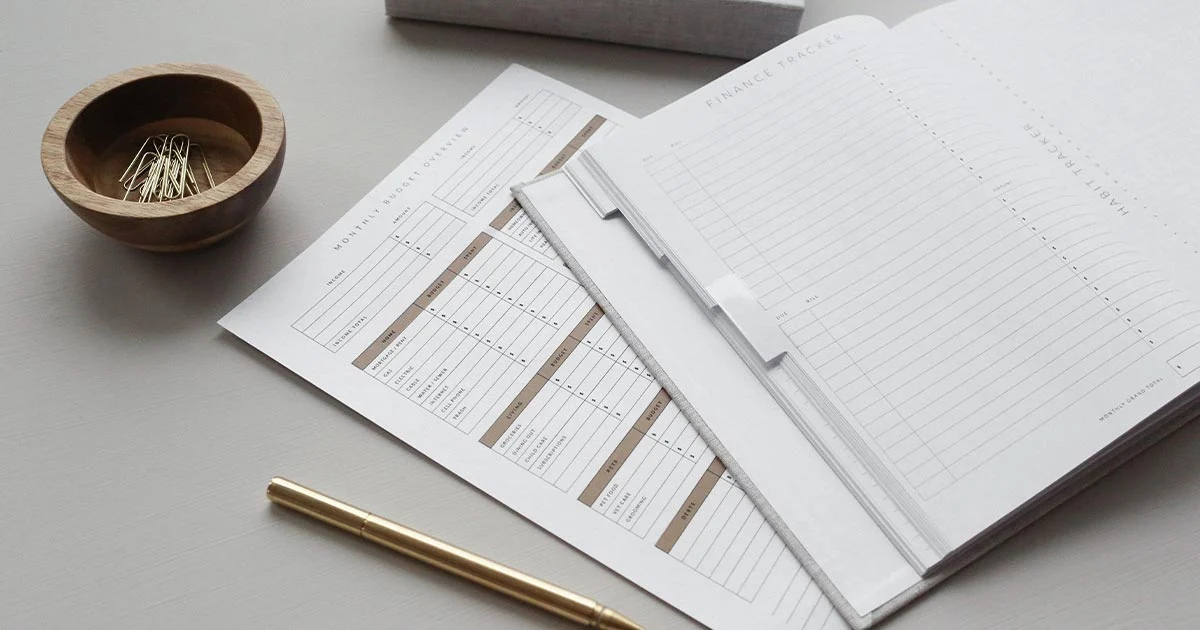How to manage your finances

In this guide, we’ll give you the best tips for managing your budget as a newcomer to Canada. Whether you’ve recently arrived or you’re just planning your move, these tips and tricks will help you manage your income and expenses, plan for your long-term success, and enjoy all the benefits of life in Canada.
#1 – Give yourself an adjustment period & save up an emergency fund
You’re starting life in a new country. It may take time to adjust to the new culture. Be easy on yourself. Mentally prepare yourself to encounter some challenges, both expected and unexpected, and remember that every challenge presents an opportunity for growth!
Maybe you didn’t realize that Canadian income is heavily taxed? Or maybe you don’t like the apartment you’ve moved into and you decide to move to a different neighbourhood? Any number of surprises can come up when you move to a new country.
These types of challenges happen. Learn from them, but don’t judge yourself. Also, try to save up an emergency fund in advance of your move. Having a chunk of money set aside for unexpected emergencies and financial surprises can help you navigate your first few months in Canada. Three months’ salary is a good target for your emergency fund, but depending on your financial situation and the comparative salaries between your home country and Canada, you may have to adjust.
#2 – Prepare for Canadian income tax and deductions
Understanding your income is the first step in budgeting, and income in Canada might be different from what you’re used to.
Depending on where you’ve lived in the past, you may be surprised to see how much of your Canadian income is deducted for income tax and other contributions. 25% or more of your income is missing? Check the deductions on your paycheque! Taxpayers (that’s you!) help to fund Canada’s robust healthcare system and a variety of social services, so prepare to pay your share.
A portion of your income will be deducted for federal and provincial income taxes and the Canada Pension Plan (or the Quebec Pension Plan, if you live in Quebec). A portion of your income will also be deducted for Canada’s Employment Insurance (EI) program. This provides financial assistance to unemployed workers in Canada, as well as to those who are sick, pregnant, caring for a new child, or caring for a sick family member. If you become unemployed or decide to have a kid, you too may benefit from EI.
Just to give you an idea, an Ontario resident with an income of CAD$60,000 per year in 2020 would have had approximately $15,000 of this income deducted for income tax, CPP, and EI contributions. Disclaimer: Income tax can vary greatly depending on your individual circumstances, so please do your research to determine what to expect for your province of residence and personal income tax circumstances — this government resource is a great place to start.
To manage your income and expenses in Canada, you’ll need a bank account. Moving2Canada is happy to recommend HSBC Bank Canada — helping you open up a world of opportunities. You can open your account online — even if you’re not yet in Canada.
Open up a world of opportunities with HSBC Bank. Get up to $1,500* in value. Start here.
#3 – Calculate your expenses in Canada
So, you’ve calculated your income in Canada. Next step — where are you going to spend it all?
For first-time budgeters, an easy place to start is the ‘50/30/20 rule’, popularized by U.S. bankruptcy expert, Elizabeth Warren. Start by calculating your income after taxes and deductions. Spend 50% on your needs (housing, groceries, transportation), spend 30% on your wants (new shoes, dinners out, hockey tickets), and the remaining 20% is for savings & debt repayment (downpayment for a house, college savings, retirement funds).
With the 50/30/20 rule guiding you, take the time to determine your expenses, not forgetting the little things that add up, such as your monthly fixed costs (insurance products, cell phone), your regular subscriptions (gym, Netflix, etc.), and the weekly take-out pizza you might be treating yourself to.
Housing, transportation, and utilities (internet, heating, electricity), will vary greatly depending on where you live. For example, the cost of housing in Toronto is much higher than in Calgary. Make sure you plan accordingly for your destination in Canada.
As well, prepare yourself for some Canadian oddities! For example, do you have regular medical expenses? You’ll want to research your health care coverage in Canada. Certain medical expenses are covered by the publicly-funded health care system, but not all of them.
#4 – Build a financial calendar for your first year in Canada
Building a financial calendar based on monthly or seasonal income and expenses can be a great way for anyone to manage their budget, but as a newcomer it can be an especially powerful exercise. Now that you’ve completed steps #1-3, it’s time to test your knowledge!

Go through the next year, month by month, and write down all of your expected net income and expenses. A simple spreadsheet will do the trick. Don’t forget to account for seasonal expenses. Your first Canadian winter might necessitate buying winter tires for your car, warm boots for your family, and paying more to heat your home. Summers? Well, don’t forget to budget for a little family vacation — no better time to explore all Canada has to offer than in the glory of the summer!
#5 – Start building your credit history and credit score
A credit score is a three-digit number that lenders will use to determine whether or not you qualify for certain types of loans and credit-based purchases. Want to get a mortgage for a house? Or a loan for a car? You’ll only be authorized to make these purchases based on your credit score.
Getting a good credit score is all about building a good credit history. Show that you can make purchases and manage payments using credit. One of the simplest ways to start building your credit is by getting a credit card, just be sure you make your monthly payments on time and try not to use the entire limit on your card.
With HSBC Bank Canada, you can qualify for a credit card with a limit of up to CAD$5,000 without having any credit history in Canada. This can provide you with the foundational tool you need to begin building your credit history in Canada. It could be your first step towards purchasing property in Canada later on.
Learn more about the HSBC Bank Canada’s chequing accounts for newcomers and find out how you could qualify for a credit card with a balance of up to $5,000 without any credit history in Canada*, PLUS a full annual fee rebate for the Primary Cardholder for the first year** ($149 value). Must apply by April 4, 2022. Conditions Apply.
#6 – Plan for the long term through investments and savings plans
We know that you’re still early in your Canadian journey, but it’s never too early to start planning for the future. Maximize your savings by utilizing special savings plans and investing options that are most popular in Canada.
A Registered Retirement Savings Plan (RRSP) can help supercharge your savings for retirement — plus, RRSP contributions are tax deductible, which could help you reduce the amount of income tax you pay.
A Registered Education Savings Plan (RESP) can help you save for your children’s education, with your own contributions being supplemented by contributions from the government!
A Tax Free Savings Account (TFSA) can enable you to save your money and invest it — tax free! Each year, you can contribute savings to your TFSA. These deposits are not deductible for income tax purposes — up to a certain limit. Plus, you don’t have to pay tax on investment income earned by your TFSA.
As a newcomer to Canada, HSBC Bank can support your journey. They provide the flexibility to put your minimum deposit in any account combination, that means your money can grow in RRSPs, TFSAs, and more, rather than sitting in a chequing account. Plus get $0 monthly chequing account fees*.
Get started with the HSBC Newcomers program, commence by opening a chequing account and you can earn up to $1,350* in value. Open up a world of opportunities with HSBC Bank. Start here.
HSBC Bank Canada is not responsible for maintaining the content on this site. Please click on the Start Here link for the most up to date information.
*Conditions & eligibility criteria apply. Offer ends on April 4, 2022. Issued by HSBC Bank Canada.
**HSBC World Elite Rewards Program or HSBC Premier World Elite Rewards Program Terms and Conditions apply.
On the market since 2006
We know the industry inside out: the details of the Due Diligence process for each citizenship and residence permit by investment program, when an affidavit is needed and the best way to resolve our clients’ problems.
Licensed agent
We work exclusively with government-licensed citizenship and residence permit by investment programs in the European Union and the Canadian.
Schedule a meeting
Let’s discuss the details
Schedule a meeting at one of the offices or online. A lawyer will analyze the situation, calculate the cost and help you find a solution based on your goals.
- Preparation of documents
- Due Diligence

10 things you should know before going to canada Buying a car in Canada Buying your first home in Canada Canadian Citizenship Canadian Study Permit Choosing the right study program Essential packing checklist Exploring destinations Express Entry Filing taxes in Canada Finding accommodation Finding a job in Canada Finding the right school Immigrants Job interview questions Learn Earn Stay Leaving your home country Opening a student bank account Open Work Phone providers in Canada Picking a destination Plan your banking Post-Graduation Work Permits Prepaid vs. Contract Plans Preparing for arrival Ship your belongings Starting your career Student accommodation study in Canada Study Permits Study Program Super Visa The International Student Roadmap The Letter of Acceptance The Student Direct Stream (SDS) Tips for exam period Top 10 reasons to study in Canada Transfer your money cheaply Travel & health insurance Utilities providers Work in Canada Work while studying write a Canadian resume Your first week in Canada Your first week in Canada student
